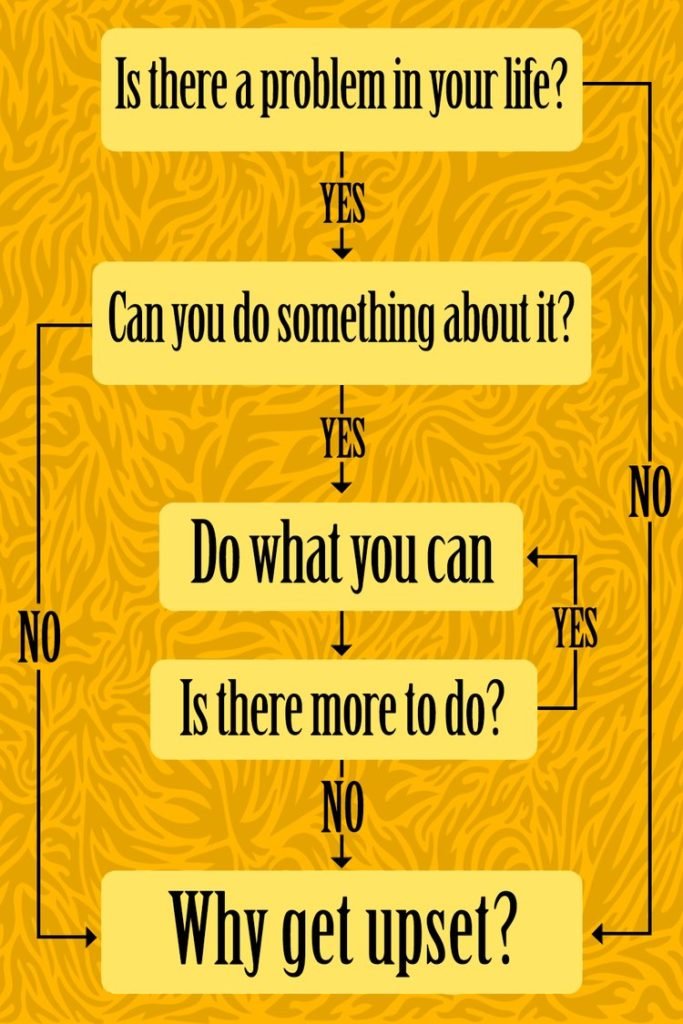“The chief task in life is simply this: to identify and separate matters so that I can say clearly to myself which are externals not under my control, and which have to do with the choices I actually control.” – Epictetus
The dichotomy of control is one of the most important and profound concepts in Stoicism. You could even say that it is the foundation of which Stoicism sits upon.
Luckily, it is also one of the simplest ideas to grasp.
So let’s take a look at what the dichotomy of control is and how you can use it to change your life.
Contents
What Is the Dichotomy of Control?
The dichotomy of control is the Stoic idea of separating things that are within our control, and things that are outside of our control.
It goes something like this:
- Things that are within your control: your thoughts and actions.
- Things that are outside of your control: everything else.
Simple as that.
Once you understand the concept of the dichotomy of control, you can focus more on the things that are within your control, and stop wasting time trying to control the things that you simply cannot.
But first, here are some specific examples of things that are within your power:
- your opinions
- your goals
- your desires
- your actions
- your reaction to events
and here are some things that are not within your power:
- the outcome of an event
- your health
- your wealth
- your reputation
- the past
At this point, you might ask, “wait what? How come those things are not within my control?”
Well, think about it, can you really control your health?
You could exercise every day, get the right amount of sleep, and eat the perfect diet. But you could still get a terminal illness.
That is why everything outside of your thoughts and actions is not within your control.
Trying your best to be healthy doesn’t mean you are immune to disease. All you can do is try to influence the outcome.
But the outcome is still out of your hands; you are only in control of how you react to it (more on this later).
“There are things which are within our power, and there are things which are beyond our power. Within our power are opinion, aim, desire, aversion, and, in one word, whatever affairs are our own. Beyond our power are body, property, reputation, office, and, in one word, whatever are not properly our own affairs.” – Epictetus
Why You Should Stop Worrying
Now that you know what the dichotomy of control is, let’s take a look at why you should stop worrying in life.
Let’s say that you are feeling unwell and you decide to get tested for coronavirus.
After the test, the doctor tells you the results will take a couple of days. You then go home and start to worry about the results.
For three days straight, you are so worried that you could bearly sleep or eat.
Finally, the results arrive, and it’s negative. You stop worrying.
“We suffer more often in imagination than in reality” – Seneca
Did all that worrying achieve anything?
No. You suffered for no reason.
But what if the test result ended up being positive?
The same applies. The only thing the worrying achieved is that you suffered twice, once before you get the results, and once after.
That is why you should stop worrying about anything in life. If it’s something out of your control, why let it bother you when you can do nothing about it?
But if it’s something within your control, why worry when you can do something about it?
Either way, worrying achieves nothing.
“There is only one way to happiness and that is to cease worrying about things which are beyond the power or our will.” – Epictetus
Other People’s Opinions Are Overrated
Along with a thousand other things, you cannot control other people’s opinions about you.
As we have learned, if it’s something you cannot control, you should stop paying attention to it.
Much like the act of worrying, caring about how you are perceived can only be a hindrance in life.
“It never ceases to amaze me: we all love ourselves more than other people, but care more about their opinion than our own.” – Marcus Aurelius
The Stoic Archer and the Anatomy of Success
You cannot control the outcome of an event, but you can try your best to influence it.
Consider the analogy of an archer shooting an arrow:
The archer can have the best posture, the most well-made bow, and the straightest arrow; but the moment he lets go of the arrow, it is not up to him whether it hits the target or not.
A gust of wind could hit the arrow mid-air, a flying bird could intercept it, or the target could fall off because it wasn’t secured properly.
Anything could happen that stops you from achieving a goal, and it wouldn’t be your fault. But if you didn’t try your best, you have already failed.
Because all you can do is focus on what you can control and try your best to achieve the preferred outcome.
The same applies to just about anything in life, a job interview, a relationship, trying to pass an exam, etc.
You can do everything in your power to try to succeed, but it is not guaranteed.
So don’t concentrate on winning the game, but rather playing your best.
Taking Your Shots
Another thing that is entirely within your control is whether you decide to do something in the first place.
Achieve the goal is not guaranteed, but if you don’t even try, it is guaranteed that you will not.
Whether it’s shooting an arrow, trying to land a job interview, or approaching a stranger in a bar, remember the only thing that is within your control is that you take the shot and try your best.
Keeping the dichotomy of control in mind can help tremendously with taking chances as it takes the unnecessary pressure off of you; because you know that by trying your best, you have already succeeded.
“It’s something like going on an ocean voyage. What can I do? Pick the captain, the boat, the date, and the best time to sail. But then a storm hits… What are my options? I do the only thing I am in a position to do, drown — but fearlessly, without bawling or crying out to God, because I know that what is born must also die.” – Epictetus
Your Judgement Is Everything
“If you are pained by any external thing, it is not this thing that disturbs you, but your own judgment about it. And it is in your power to wipe out this judgment now.” – Marcus Aurelius
What happens when you do everything in your power in something, and it still fails?
A common reaction might be to get frustrated, angry, or sad. But does any of those emotions achieve anything?
You might argue that those emotions are entirely justified because it is human. But animals feel emotions too.
It is more human to think than it is to feel. Whether you like it or not, it is not our ability to be angry or sad that makes us unique as a species, but rather our ability to reason.
Thinking got us to the top of the food chain, not feeling.
This is why you have a say in how you react to any situation.
Remember the dichotomy of control, what’s happened has already happened, there is no reason to get worked up by it.
But what will happen is yet to come, and that will be based on how you react to the situation.
“Fate leads the willing, and drags along the reluctant.” – Cleanthes
If it’s something that can be dealt with and made better, deal with it. If it’s something you can no longer do anything about, then accept it with equanimity.
The Initial Flinch
Having said that, the Stoic understood that there is always an initial reaction to situations, which cannot be controlled.
The Stoics called this “proto-passions”.
For example, if you work at NASA and you’ve spent years working on something, only to have the program canceled by a new president. Your initial reaction would be to feel upset or disappointed.
But after that initial moment of proto-passion, you get to decide whether you let the negative emotions take over or not.
“We don’t control our initial reaction, perhaps, but we do control how we respond to it: it’s not what happens first that matters but what you do next.” – Donald Robertson
You have the power to resort to basic instincts, or rise above your emotions and do what is best no matter what happens.
Turning Adversity into Strength
“The impediment to action advances action. What stands in the way becomes the way.” – Marcus Aurelius
Having an understanding of the dichotomy of control is crucial for turning a bad situation into a good one.
Whatever happened, happened, it is no longer within your control. But you can still control how you react to it.
And how you react to the situation can be the difference between victory and defeat. Between greatness and mediocre.
Let’s take Richard Turner, for example.
Richard contracted scarlet fever at the age of nine, which lead to him become legally blind by the time he was a teenager.
Instead of letting the blindness hinder him from pursuing his goals in life, Richard used it as fuel to work even harder.
He went on to earn a fifth-degree black belt in karate. Then he became one of the greatest card magicians of all time. Richard has not missed a workout in 40 years and he practices magic 14 hours a day.
Richard understood that there was nothing he could have done about his blindness. But there was a whole lot he could do about how he dealt with the blindness.
Instead of feeling sorry for himself or being defeated by the disability, he chose to deal with it by working ten times harder than anyone else. And he has now accomplished more than most people could ever do with perfect eyesight.
That is the pinnacle of using the dichotomy of control to turn adversity into strength. Set your focus on what is within your control, and you will reach the summit before you know it.
“I judge you unfortunate because you have never lived through misfortune. You have passed through life without an opponent— no one can ever know what you are capable of, not even you.” – Seneca
Putting It All to Use
2,000 years ago, philosophers were more than just thinkers; they were doers.
The point of philosophy was not just to read and write books on complicated concepts, but rather to put all the wisdom to use in day to day life. As the original meaning of the word “philosophy” was “love of wisdom.”
So, are you going to be more like a modern philosopher, or an ancient one who improves himself by putting everything he learns to use?
“Waste no more time arguing what a good man should be. Be one.” – Marcus Aurelius
At the start of this article, I wrote that the dichotomy of control is one of the simplest ideas in Stoicism.
That is true, but just like most things in life, simple does not mean easy.
It certainly doesn’t take much thinking to understand this concept, but it will take a lot of doing if you want to use it to change your life.
So let’s take a look at some ways you can use the dichotomy of control in your life.
Premeditation of Adversity
This is one of the most useful exercises in Stoicism.
The idea is to visualize setbacks or things going wrong, in order to strengthen your ability to shrug in the face of adversity.
You can visualize anything from small to big, some examples include:
- getting a flat tire
- losing your wallet
- getting fired
- finding out you have cancer
While you are visualizing these adversities, remember the dichotomy of control; think about if there’s something you could do about the situation.
This will help you practice putting things into categories of what’s within your control and what’s outside of your control.
Take as long as you need while visualizing adversities, don’t be afraid to go really specific. Do this once in a while, and you will start to see things in life through the only two categories that matter.
For a more in-depth explanation of visualizing adversities, read it here.
Nightly Reflections
This is a fairly straight forward exercise. Every night before you go to bed, spend 5 minutes thinking about the events that happened that day.
Consider what was within your control, and what was not.
Then think about the times when you let something outside of your control take hold of your emotions.
Don’t judge yourself for it, but just acknowledge what you could have done better, and make it your goal to improve it for next time.
Don’t Think of an Elephant
I bet you three dollars that you’re thinking of an elephant right now.
So, the next time something happens that upsets you or makes you angry, DO NOT think of a purple elephant.
Chances are, you will think of that purple elephant, then you will remember this article. Then you will realize that what’s happening is outside of your control, and the only thing you should focus on is how you react to it.
At that point, it’s up to you whether you act calmly and rationally, or let your emotions get the better of you.
More Stoic Exercises
If you want to learn or about useful Stoic exercises check out our free 7 Stoic Exercises Guide:
Related Posts:
How to Be Invincible in Life – A Stoic Guide on Indifference
How Voluntary Discomfort Can Change Your Life
How Negative Visualization Can Change Your Life (Premeditatio Malorum)
































Thanks for the tips. As a beginner, I can use all the help available. I’m enjoying your other articles too.
[…] One of the most important aspects of living according to nature is the ability to focus on the things in life you can control, and not allowing the external world to dictate your emotions or happiness. This is called the Stoic dichotomy of control. […]